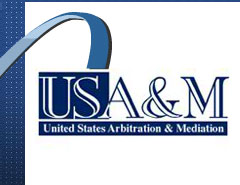How much does it cost to arbitrate?
What is arbitration?
How does arbitration work?
What are the benefits of arbitration?
What is high-low arbitration?
Is arbitration final?
How much does it cost to arbitrate?
What is arbitration?
Arbitration is a method of dispute resolution in which a neutral third party, an arbitrator, conducts an evidentiary hearing. Upon consideration of the evidence, the arbitrator makes a legally binding decision.Arbitration differs from mediation in that once you enter the arbitration process, you are bound by the arbitrator’s decision. Mediation is a negotiation process, where the mediator guides parties to a mutually acceptable solution. Back to top
How does arbitration work?
Arbitrations conducted through United States Arbitration & Mediation are governed by the USA&M Rules of Arbitration. The Rules of Arbitration provide an administrative structure for the arbitration, including a method of selecting a mutually acceptable neutral arbitrator. The selected arbitrator then rules on pre-hearing disputes or questions, conducts the arbitration session, and finally issues a binding award.Arbitration hearings are attended by the parties involved, their attorneys, the arbitrator, and the parties’ witnesses. Each party makes an opening statement, presents evidence, questions and cross examines witnesses, and makes a closing statement. During this presentation, formal rules of evidence generally do not apply. The arbitrator then renders his or her award. Back to top
What are the benefits of arbitration?
Arbitration provides distinct advantages over the court system in many different types of disputes. Because arbitration is a private method of settling disputes, parties can tailor the arbitration proceeding in almost any manner they choose. For example, parties involved in arbitration can agree to limit the number of witnesses each side will present, set parameters on the amount and type of evidence that will be presented, and pre-determine what issues the arbitrator’s award should cover.Another important benefit of arbitration is its ability to provide the parties with an arbitrator experienced in the subject matter of the dispute. Many cases involve complex evidence, testimony, and documents. The arbitrator’s knowledge allows for a quick understanding of the issues, which in turn saves time and expense.
Because they are conducted by private agreement, arbitration hearings are not open to the public and awards are generally not matters of public record. Back to top
What is high-low arbitration?
In High-Low arbitration, the parties mutually establish, prior to the hearing, a range in which the award will not be above a certain figure nor below another figure. lf the arbitrator’s decision is between the high and the low, that amount is the final award. However, if the award is above the pre-set maximum, it automatically moves down to the previously agreed-upon high figure. Conversely, if the arbitrator’s decision is below the established minimum, the award moves up to the predetermined low figure. In most instances the parties agree to not inform the arbitrator of the range of their High-Low agreement. Back to topIs arbitration final?
Arbitration awards are final and binding on all parties to the arbitration, and may not be appealed. Awards may be confirmed in any court having jurisdiction and, thereafter, carry the same force and effect as an original court decision. USA&M Rules of Arbitration include an Internal Appeal Procedure, but it does not apply unless the parties specifically so state in their Contract to Arbitrate.Back to top
NOTE: Nothing contained herein is intended to give legal advice. Individuals should always consult with an attorney before entering into a contract.

